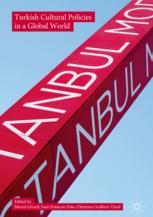

Most ebook files are in PDF format, so you can easily read them using various software such as Foxit Reader or directly on the Google Chrome browser.
Some ebook files are released by publishers in other formats such as .awz, .mobi, .epub, .fb2, etc. You may need to install specific software to read these formats on mobile/PC, such as Calibre.
Please read the tutorial at this link: https://ebookbell.com/faq
We offer FREE conversion to the popular formats you request; however, this may take some time. Therefore, right after payment, please email us, and we will try to provide the service as quickly as possible.
For some exceptional file formats or broken links (if any), please refrain from opening any disputes. Instead, email us first, and we will try to assist within a maximum of 6 hours.
EbookBell Team

4.8
94 reviewsThis book provides a multidisciplinary analysis of the production of Turkish cultural policies in the context of globalization and of the circulation of knowledge and practices. Focusing on circulations, the book proposes an innovative approach to the transfer of cultural policies, considering them in terms of co-production and synchrony. This argument is developed through an examination of circulations at the international, national, and local levels; employing original empirical data and case study analyses.
Divided into three parts the book first examines the Kemalist legacy, before turning to the cultural policies developed under the AKP’s leadership, and concludes by investigating the production of cultural policies in the outlying regions of Turkey. The authors shed new light on the particular importance of culture to the understanding of the societal upheavals in contemporary Turkey. By considering exchanges as circulations rather than one-way impositions, this book also advances our understanding of how territories are (re)defined by culture and makes a significant contribution to the interrogation of the concept of “Westernization”.
This book brings into clear focus the reconfigurations currently taking place in Turkish cultural policy, demonstrating that while they are driven by the ruling party, they are also the work of civil society actors. It convincingly argues that an authoritarian turn need not necessarily spell the end of the cultural scene, and highlights the innovative adaptations and resistance strategies used in this context. This book will appeal to students and scholars of public policy, sociology and cultural studies.